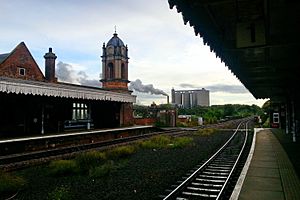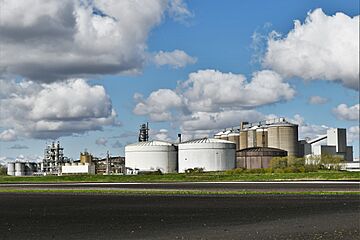British Sugar facts for kids
 |
|
|
Formerly
|
British Sugar Corporation Limited (1936–1982) |
|---|---|
| Subsidiary | |
| Industry | Sugar beet processing |
| Founded | 1936 |
| Headquarters |
,
England, United Kingdom
|
|
Number of locations
|
5 |
|
Area served
|
United Kingdom |
|
Key people
|
Keith Packer (managing director) |
| Products | Sugar Bioethanol Animal feed Topsoil Soil conditioners |
| Revenue | |
|
Operating income
|
|
|
Number of employees
|
1,400 (2021) |
| Parent | Associated British Foods |
British Sugar plc is a large British company that makes sugar. It is a subsidiary, which means it is owned by a bigger company called Associated British Foods. British Sugar is the only company in the United Kingdom that produces sugar from a plant called sugar beet.
Contents
Company History


How British Sugar Began
| Sugar Industry (Reorganisation) Act 1936 | |
|---|---|
| Act of Parliament | |

|
|
| Long title | An Act to provide for the establishment of a Sugar Commission; for the amalgamation into a single corporation of companies manufacturing sugar from home-grown beet; for granting financial assistance to that corporation and to the companies aforesaid; and otherwise for the reorganization of the sugar industry. |
| Citation | 26 Geo. 5 & 1 Edw. 8. c. 18 |
| Dates | |
| Royal assent | 21 May 1936 |
| Other legislation | |
| Repealed by | Sugar Act 1956 |
|
Status: Repealed
|
|
British Sugar was created in 1936. Back then, it was called the British Sugar Corporation. It was formed when the British government decided to bring the whole sugar beet industry under one company. This is called nationalization. Before this, 13 different companies ran 18 sugar factories across Great Britain.
In 1972, the company started selling its sugar to the public under the brand name Silver Spoon, which you can still find in shops today.
Changes in Ownership
The government originally had a large stake in the company. But over time, it sold its shares. In 1982, the company's name was changed to British Sugar plc. Later that year, it was bought by a company called Berisford International.
In 1991, British Sugar was sold again, this time to Associated British Foods (ABF), which still owns it today. In 2004, British Sugar also bought another sugar company called Billingtons.
Factory Closures
Over the years, many of the original 18 factories have closed. For example, the factory in Cupar, Scotland, closed in 1971. This meant that farmers in Scotland stopped growing sugar beet.
More factories closed in the 1980s and 1990s. The factories in Allscott and York were among the last to close in 2007. The York factory closed because the sugar beet crops in northern England were not growing well. The Allscott factory was considered too small to run well.
Today, only four of the original factories are still open and processing sugar beet. They are:
- Bury St Edmunds in Suffolk
- Cantley in Norfolk (the first successful sugar factory in Britain, opened in 1912)
- Newark-on-Trent in Nottinghamshire
- Wissington in Norfolk (the largest sugar factory in Europe)
The old, closed factory sites have been sold. Some have been completely demolished, like the one at Allscott. At other sites, like the one in Ipswich, the large concrete silos used for storing sugar were only recently torn down in 2018.
What British Sugar Does Today
British Sugar is the only buyer for all the sugar beet grown in the United Kingdom. It works with about 2,300 farmers who grow the crop.
Besides making sugar for food, the company also produces other things from sugar beet. These include:
- Bioethanol: A type of fuel made from plants.
- Animal feed: Food for farm animals.
- Topsoil: High-quality soil for gardens and farms.
Management
The former managing director of British Sugar was Paul Kenward. He is married to Victoria Atkins, a Member of Parliament. He now works for the parent company, ABF Sugar.
See also


